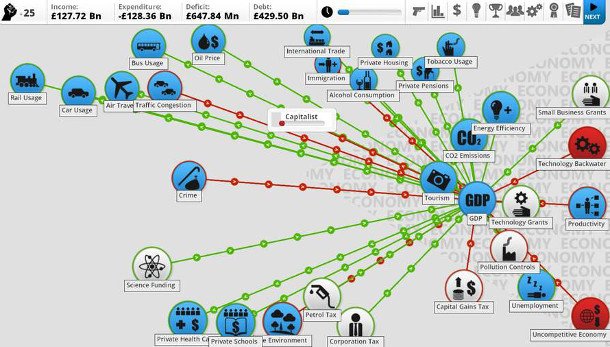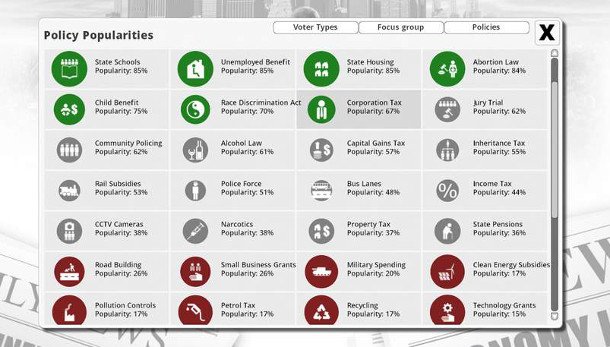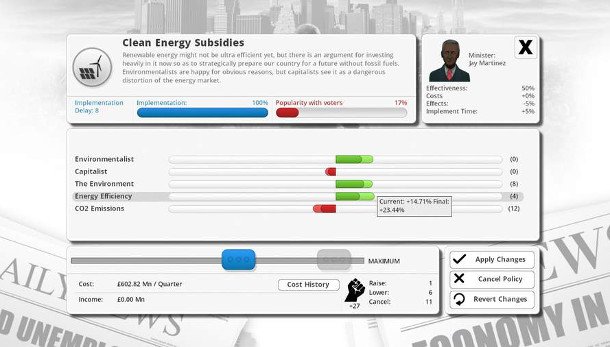Democracy 3 hands on: losing elections with land mines in a complex politics sim

It's completely and utterly ridiculous and silly to think that anyone could sit down and say they could make a simulation of democracy,” says Cliff Harris. He should know, what with being the man behind the democracy sim series, Democracy. “But as a result nobody's done it. I'd much rather play a flawed or imperfect version of politics than not just because everyone says it's too difficult.”
The series is now gearing up for a third outing, and we are talking in a coffee shop near the Rezzed booth where Cliff has been previewing the game for attendees. The conversation thus far has encompassed monkey brains, the US Department of Defense and implementing a 'Boris Johnson mode'. We'll get to why in a minute. Firstly, here's what would happen if the UK were run by a sleep-deprived games journalist hopped up on caffeine and power.
As the new leader of the UK I have, as they are so fond of saying on Question Time, “some problems inherited from the previous government.” Focusing on the economy seems to be a sensible (and relatively popular) thing to do because there's more money going out than coming in, so I introduce a luxury goods tax. The UK's credit rating drops instantly.
While I ponder the complexities of international finance, I bring in an opt-out organ donation law and start construction of a monorail. Because there's nothing on earth like a genuine bona fide electrified six-car monorail. Maternity leave is another must-have for my nation, and I start to suspect I'm the most benevolent leader the UK has ever known. I hum a few bars of Jerusalem.

My citizens are not so sure and the money situation still looks a bit wonky, so I top up the coffers with a graduate tax. Guilt sets in pretty quickly over that so I add some kind of telecommuting policy. The graduates can now work from home in their pyjamas while they pay off their loans, thereby saving money on outdoor clothes.
The UK's credit rating drops again. Oh, and there's an art theft. I cancel rail subsidies because, y'know, there's a genuine bona fide electrified six-car monorail to use instead. Next turn please.
All the graduates are leaving the country. Apparently my graduate tax may be somehow involved in this turn of events. Well, there won't be a brain drain if there are no brains left, will there? I abolish state schools. I also say yes to the export of land mines. That'll teach those treacherous graduates to leave the country. Have fun with those land mines, chumps.
The biggest gaming news, reviews and hardware deals
Keep up to date with the most important stories and the best deals, as picked by the PC Gamer team.
“EGALITARIAN MIRACLE!” My balanced approach to politics (using a carrot to smack people in the arm while forcefeeding them a stick) has unlocked an achievement. I wonder for a moment whether the game is being sarcastic, but it seems to be genuinely pleased for me. My strategy of antagonising a lot of different groups equally seems to be paying off nicely.
But, because of the looming election, my integrity suddenly vanishes like a cat who has sensed a trip to the vet. Only popular policies will be implemented from now on. I give everyone free eyetests, introduce a minimum wage and crank up the severity of the mansion tax.
My party is hovering at the 48.8% popularity mark. So close to victory! Free school meals! Reintroduce state schools (at the lowest possible cost) in which to eat those free meals! Tasers (because they are anti-crime)! Legalise prostitution (also because it is anti-crime)! I brace myself and click 'count vote'. I wish David Dimbleby were televising this.
Apparently somewhere between the genuine bona fide electrified six-car monorail, the prostitutes and the land mines, I lost the support of the electorate. I am ousted from office and now must contemplate a new career of lucrative after-dinner speaking engagements. I wave sadly at an imaginary David Dimbleby and contemplate what went wrong.

Democracy 3 is a tricky beast, reacting far better to gentle changes and careful manipulation of figures and policies than to knee-jerk politicking. At first glance it looks like its predecessor, Democracy 2. A web of icons represents policies and problems across the different sectors of society. You, as the leader of a political party, must spend influence at three-month intervals to shape the development of your country with the goal of staying in power as long as possible. Or, if you play like me, just trying to get to the next election without a coup or an assassination because you've sacrificed everyone's civil liberties to build a spaceship.
Under the familiar facade is a game that has been coded from the ground up – the result of problems with save games in Democracy 2 – and one that has introduced ever-more-subtle ways of modelling the world of vote-centric politics. For example, it's the only game I've ever played where 'more accurate cynicism simulation' and 'complacency modelling' are listed in the preview notes.
“By far the hardest part is coming up with a way to make it look like a game,” Harris says, referring to the spruced-up interface. It has been streamlined, the icons made brighter and simpler and the vast swathes of information rendered more easily intelligible. “It has no map, no 3D world. It's just a load of icons connected to each other, which is a quite risky thing to do. I can imagine people looking at it and thinking, 'How do I close this menu and get to the game?'”
Actually, it's a pretty intuitive experience, and the tutorial (as it stands) imparts information about each screen as you explore. But there's a lot to take in and the number of graphs, charts and variables can be off-putting. It's a game that Harris says “assumes gamers are educated, intelligent, thoughtful and interested in complex world events. It's hopefully the opposite of a dumbeddown game. Smarted-up, perhaps?”

